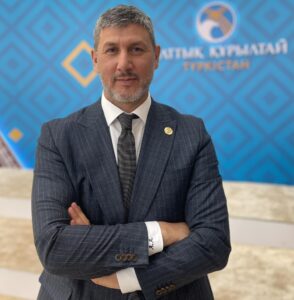ASTANA— Ethnic groups united by the Assembly of the People of Kazakhstan (APK) represent not only that ethnicity but 20 million citizens, contributing to maintaining peace and harmony in Kazakhstan’s multinational society. Kazakhstan is one nation, one country, with one destiny and one story, said Asker Piriyev, the head of the Ahiska Turkish Ethnocultural Association and an APK member, in an interview with The Astana Times.

Asker Piriyev, head of the Ahiska Turkish Ethnoultural Association and APK member. Photo credit: Asker Piriyev
Established ın 1989, the Turkish Ethnocultural Center in Kazakhstan initially served as a vital institution for the Turkish diaspora. It gained official status two years later and has played a crucial role in preserving Turkish cultural heritage, fostering Kazakhstan’s civic identity and promoting patriotism. This center has become an integral part of the history of independent Kazakhstan.
Piriyev highlighted the evolution of regional Turkish cultural centers, which have merged under the leadership of the main center. The branches of the Turkish Ethnocultural Centers operate throughout Kazakhstan.
The Turkish center and APK
Since its inception in 1995, the Turkish Ethnocultural Center has operated under the auspices of the APK. Piriyev noted that these centers are open to all people.
“This is a profound misconception that the centers are intended exclusively for representatives of a certain ethnic group. In Kazakhstan, any public association is open to all citizens regardless of ethnicity,” said Piriyev.
“The APK represents the interests of all 20 million citizens of Kazakhstan,” he added.
Initially named the Assembly of the Peoples of Kazakhstan, the institution was constitutionally recognized in 2007 as the Assembly of the People of Kazakhstan, underscoring the unity among its diverse population.
Piriyev noted that Kazakhstan’s model of interethnic harmony garnered international attention and attracted many delegations seeking to understand its success.
“I call it a success. In the 1990s, it was hard to believe that achieving unity would be possible with so many ethnic groups. However, the strength and wisdom of the Kazakh people made it possible to unite people under one shanyrak (the round crown at the top of the Kazakh yurt) despite the differences in languages and customs,” said Piriyev.
Activities of the center
In 2007, all regional Turkish Ethnocultural Centers consolidated into a unified organization, which expanded with a branch in Astana the same year. The organization’s activities range from cultural preservation and educational initiatives to sports and investment promotion.
Piriyev noted that special attention is paid to attracting investments, which contributes to the development of the Turkish diaspora and Kazakhstan. The center attracts Turkish investors by providing information about the opportunities and benefits available in Kazakhstan and vice versa.
“To give the right image of a favorable business climate, ethnocultural centers should serve as a bridge between Kazakhstan and the historical homeland. This is what other ethnic groups also do,” he added.
The Turkish Ethnocultural Center initiatives include annual events such as football tournaments, a state language olympiad for non-Kazakhs, and summer camps for school children.
“One of our most cherished projects is the Lyceum School No. 1 in Talgar, near Almaty, built by the Turkish Ethnocultural Center in 2010. It offers education in four languages and is open to all students seeking a high-quality education,” said Piriyev.
In addition, the center publishes the Ahiska newspaper and the Türk Birliği (Turkic Unity) magazine, which cover the life of the Turkish diaspora in Kazakhstan.
House of Friendship, social projects, volunteer activities
Piriyev highlighted Kazakhstan’s unique institution, the Dostyk Uyi (House of Friendship), which houses all the country’s ethnic and cultural centers under one roof. This venue in Astana serves as a hub for communal activities, exhibitions, and events and is open to everyone.
“It has indeed become a hub of communion. Various events are held there, including activities related to ethnocultural associations, chess tournaments, table tennis matches, contests, and concerts,” said Piriyev.
The Turkish Ethnocultural Center also spearheads social initiatives, including an annual celebration organized for visually impaired women on International Women’s Day. This event aims to draw public attention to the problems of people with disabilities and create a platform for them to express themselves.
“We have been holding this event for the past ten years now. For people with visual disabilities, the attention of others is very crucial. They may not see, but they beautifully sing and play various instruments. They feel the audience and truly enjoy applause,” noted Piriyev.
“This project is one that I really like. It is very soulful,” he added.
Additionally, the center contributed to disaster relief efforts. During and after the last spring floods, more than 12,000 APK volunteers assisted the affected residents and rescuers. Over 1,500 tons of food and essential goods worth more than 770 million tenge ($1.7 million) were delivered to the devastated areas.
“The APK is an organization with many structural divisions. Its members are politicians, athletes, and National Kurultai (Congress) members, always involved in the life of our country. It is important to break the stereotype that the APK is only songs and dances on Unity Day on May 1. It works 365 days a year,” said Piriyev.
Human capital as Kazakhstan’s greatest asset
“In the 21st century, our most valuable asset is human capital,” emphasized Piriyev.
He noted that Kazakhstan excelled in sports and culture, with globally renowned figures like singer and composer Dimash Kudaibergen, world weightlifting champion Ilya Ilyin, athlete with four Guinness World Records Sergei Tsyrulnikov, boxer Firuza Sharipova, and many others.
“By investing in our people, Kazakhstan can nurture future leaders and innovators. I am glad to see the younger generation is eager to enroll in universities and engage in sports and startups. We are a developing country with very active and prospective youth,” said Piriyev.
